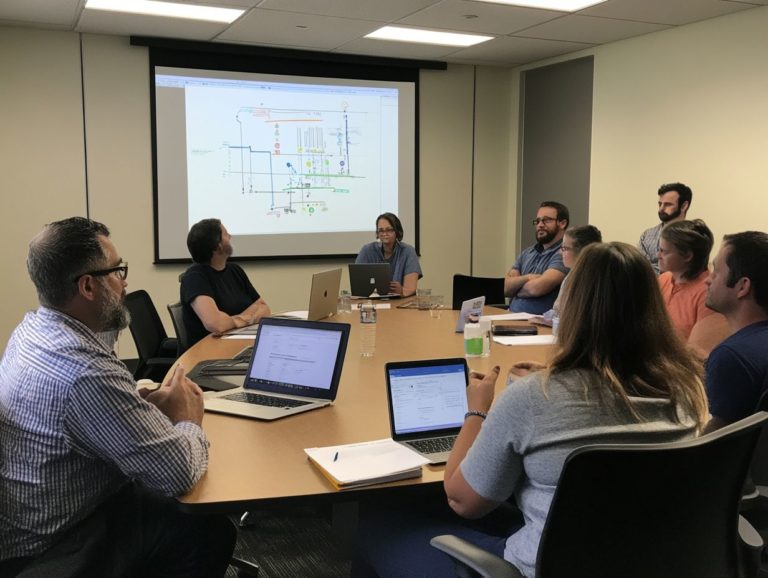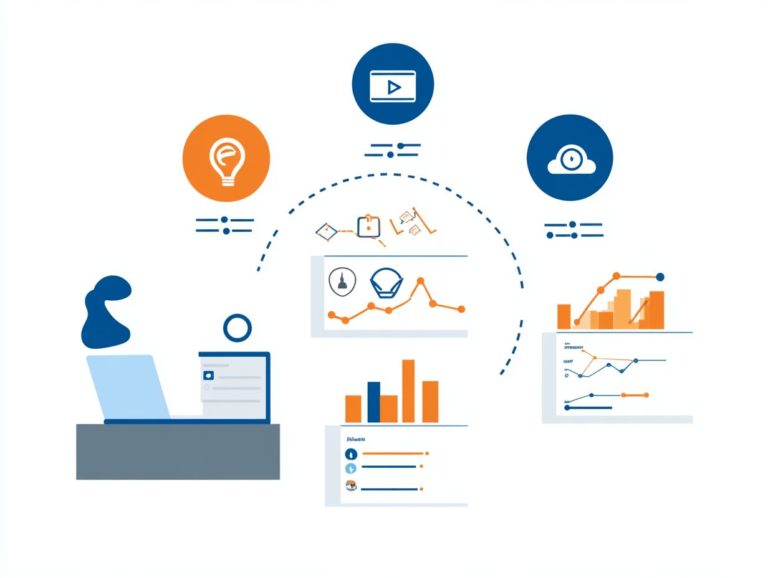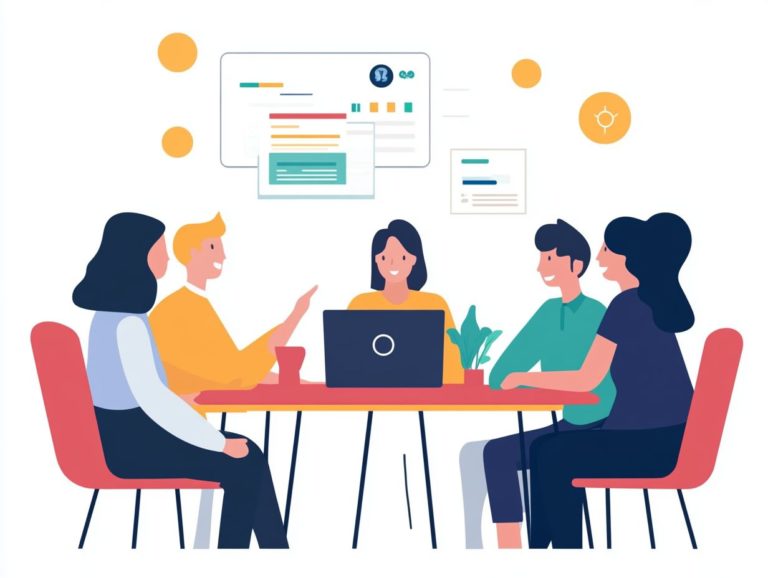“How to Conduct Effective CRM Training Sessions”
In today s competitive landscape, mastering Customer Relationship Management (CRM) is essential for you if you’re aiming to enhance customer interactions and drive revenue.
This article delves into the essentials of CRM training, guiding you from understanding its purpose to recognizing valuable benefits, such as improved customer relationships and increased sales.
You ll explore the key components of effective training, including:
- Identifying needs
- Developing tailored materials
- Implementing successful strategies
You will discover best practices for creating engaging sessions and tips to ensure long-term success.
Get ready to elevate your CRM training approach and transform the way your team connects with customers!
Contents
- Key Takeaways:
- Understanding CRM Training
- Benefits of CRM Training
- Key Components of Effective CRM Training
- Best Practices for Conducting CRM Training Sessions
- Tips for Ensuring Long-Term Success
- Frequently Asked Questions
- What is the purpose of conducting CRM training sessions?
- Who should attend CRM training sessions?
- How often should CRM training sessions be conducted?
- What are some key elements to include in CRM training sessions?
- How can I ensure that employees are retaining information from CRM training sessions?
- What are some common challenges faced when conducting CRM training sessions?
Key Takeaways:

- Understand the purpose of CRM training.
- Learn how it improves customer relationships and boosts sales.
- Identify training needs and develop effective materials.
- Create a positive learning environment during sessions.
Understanding CRM Training
CRM training is vital for any organization looking to improve customer relationships, refine sales processes, and optimize user training.
This training takes a holistic approach, equipping CRM teams with the essential skills to harness customer data, engage clients effectively, and apply best practices that improve performance.
It ensures that team members, from sales managers to marketing professionals, become proficient in utilizing CRM systems, leading to improved data accuracy and enhanced customer service.
What is CRM Training?
CRM training consists of structured programs crafted to educate you on effective customer relationship management practices and the use of various CRM software tools. These programs cover essential components such as understanding customer data, mastering specific software functionalities, and honing communication skills that elevate customer interactions.
The goal is to give you the knowledge and skills needed to leverage CRM systems effectively, enabling you to track customer interactions, streamline processes, and enhance customer satisfaction.
User training is pivotal in maximizing the effectiveness of CRM systems; well-trained employees are far more likely to harness these tools to their fullest potential, leading to improved productivity and customer engagement.
By concentrating on these elements, organizations can establish a robust framework that not only enhances team performance but also propels overall business success.
Benefits of CRM Training
The benefits of CRM training are numerous and significant. It is essential for enhancing customer relationships, driving sales growth, and ultimately elevating your organization s ROI.
Improving Customer Relationships
Improving customer relationships through CRM training means equipping yourself and your team with the skills needed to manage customer interactions effectively while enhancing overall satisfaction.
By fostering a strong understanding of CRM tools and strategies, you can enable your staff to respond to inquiries swiftly, personalize communications, and resolve issues with greater efficiency. This proactive approach not only helps cultivate a deeper bond with customers but also encourages repeat business, fostering loyalty.
Enhanced training leads to better data management practices, allowing your team to analyze customer behaviors and preferences, resulting in more well-considered choices. Ultimately, investing in CRM training enriches customer experiences, translating directly into long-term business success and a competitive edge in the marketplace.
Start your CRM training journey today!
Boost Your Sales and Revenue
Effective CRM training boosts your sales and revenue directly. It enables you and your sales team to optimize your sales processes and elevate performance metrics.
Targeted training unlocks the full potential of CRM tools, enhances customer interactions, and streamlines communication. By understanding customer behavior and needs, you can tailor your sales strategies effectively.
This not only increases your conversion rates but also fosters long-term relationships with clients. A well-trained team is in a prime position to spot upsell and cross-sell opportunities.
The insights gained from CRM analytics are crucial for creating strategies that attract new clients while retaining existing ones, ultimately driving significant revenue growth.
Key Components of Effective CRM Training

Effective CRM training starts with knowing what you need. Create tailored materials and strategies that emphasize data accuracy and practical applications.
This approach equips you to maximize your CRM system’s potential.
Identifying Training Needs
Identifying your training needs is a pivotal step in creating a successful CRM training program. It allows you to tailor the training to the performance metrics and user requirements that matter most.
By assessing these needs, you can use different ways like surveys, interviews, and performance evaluations to gather essential insights into current skill gaps and knowledge deficiencies.
This process isn t just about relevance; it s about ensuring your training aligns seamlessly with broader organizational goals, enhancing workforce efficiency.
Using tools like the Training Needs Assessment helps pinpoint what s most important. When training is thoughtfully targeted and aligned with your objectives, employees are much more likely to engage with the content.
This engagement will supercharge your performance and support the strategic vision of your company.
Creating Training Materials
Creating effective training materials is key to mastering your CRM system. A comprehensive approach involves various resources tailored to your needs, such as:
- Detailed manuals that offer step-by-step guidance,
- Online courses that provide flexibility and accessibility,
- Interactive modules that engage you through hands-on practice.
Integrating these diverse materials enhances your overall learning experience, catering to your unique learning style.
Manuals serve as invaluable reference tools, online courses let you learn at your own pace, and interactive modules create an immersive environment that keeps you engaged.
Collectively, these elements not only bolster your confidence but also improve retention rates, leading to more proficient use of the CRM system.
Using Effective Training Strategies
Using effective training strategies is vital for your CRM success. Emphasize continuous improvement and seamlessly integrate new features and updates.
You can greatly benefit from a blend of training approaches tailored to your specific needs.
- Workshops create interactive experiences, fostering collaboration and real-time problem-solving.
- E-learning modules offer the flexibility to engage with content at your own pace.
- Hands-on sessions cultivate practical skills, ensuring you feel confident navigating new functionalities.
Combining these strategies facilitates user adoption and promotes ongoing development, allowing your teams to harness the full potential of their CRM systems and drive performance forward.
Best Practices for Conducting CRM Training Sessions
To run great CRM training sessions, create a positive environment that keeps everyone engaged. It s essential to engage your audience effectively and ensure they re fully involved in the process.
Evaluating how effective the training is matters greatly. This will help confirm that knowledge is not only retained but also applied in practical scenarios.
Creating a Positive Learning Environment
Creating a positive learning environment is crucial in your CRM training. It actively fosters engagement and encourages your participation in the process.
By implementing strategies like interactive workshops, peer mentoring, and open feedback sessions, you help cultivate a sense of community among all participants.
This collaborative atmosphere boosts morale and enhances the overall effectiveness of the training.
When you incorporate real-world scenarios and hands-on practice, you allow trainees to connect the material with their daily responsibilities. This significantly increases retention and practical application.
Empowering you and your peers to share insights and experiences further enriches the training experience. It makes the training more relevant and impactful.
In the end, a supportive environment can dramatically improve CRM adoption and competency among users like yourself.
Engaging Participants

Engaging participants during CRM training sessions is essential for keeping them interested, motivated, and actively involved in their learning experience.
To achieve this, incorporate interactive activities that promote collaboration, such as role-playing scenarios or gamified challenges designed around real-world CRM applications.
Group discussions create connections among participants. This allows them to share insights and experiences, ultimately enhancing their understanding and retention of the material.
Hands-on practice sessions enable users to become familiar with the CRM interface. This gives them the opportunity to experiment and learn in a supportive environment.
By combining these methods, you drive higher levels of engagement. This leads to more productive training outcomes and enables participants to utilize CRM tools with confidence and effectiveness.
Evaluating Training Effectiveness
To ensure your training hits the mark, evaluate its effectiveness. This is essential to determine if it meets its objectives and enhances performance metrics as well as certification readiness.
To gain comprehensive insights, utilize various evaluation methods. Feedback surveys capture trainees’ perceptions and learning experiences.
Assessments are crucial in measuring knowledge retention and the application of skills. They provide a tangible way to gauge understanding.
By tracking performance, your organization can monitor measuring success over time. This yields valuable data on improvements in productivity and compliance.
With a multi-faceted approach, you can ensure that CRM training successfully translates into real-world success. This fosters greater employee confidence and enhances customer satisfaction.
Tips for Ensuring Long-Term Success
To achieve long-term success in CRM, it is crucial to reinforce training concepts, implement ongoing training programs, and cultivate a culture of continuous improvement within your organization.
Embracing these practices will enhance your team’s skills and drive sustained growth and effectiveness in your CRM initiatives.
Reinforcing Training Concepts
Reinforcing training concepts in CRM is essential for you to retain and effectively apply your knowledge in real-world scenarios.
Utilizing various techniques, such as structured follow-up sessions, can significantly enhance your understanding.
These sessions offer a chance to revisit key elements and clarify any confusion that may have arisen during the initial training.
Periodic refresher courses keep you updated on new features and evolving best practices.
Engaging in practical applications of the concepts you’ve learned through real-life projects or case studies solidifies your learning process. This approach boosts your confidence and helps you excel in your role!
Ongoing Training and Development
Ongoing training in CRM is vital. It keeps you updated on system enhancements and best practices.
Integrating this commitment into your culture enhances your skills and boosts productivity. A learning-oriented environment lets you embrace new technologies with confidence.
Participate in workshops, online courses, and peer sessions to further your education.
Establish a feedback loop to share insights. This will refine training programs to meet your needs more effectively.
When organizations prioritize learning, they equip you with essential tools for success. This also fosters a more agile and innovative workplace.
Frequently Asked Questions
What is the purpose of conducting CRM training sessions?

CRM training sessions teach employees how to use customer relationship management tools. This improves customer interactions and boosts sales.
Who should attend CRM training sessions?
Employees using CRM tools, like sales and customer service representatives, should attend. It’s also beneficial for managers to understand the system’s capabilities.
How often should CRM training sessions be conducted?
The frequency depends on organizational needs and employee proficiency. Initial training is essential for new employees and during system updates.
Ongoing sessions help refresh knowledge and introduce new features.
What are some key elements to include in CRM training sessions?
Key elements should include an overview of the CRM system, hands-on practice, real-life scenarios, and Q&A sessions. Emphasize the importance of data accuracy and system utilization.
How can I ensure that employees are retaining information from CRM training sessions?
Provide handouts or training materials for reference. Follow-up sessions and periodic assessments ensure retention.
Managers should monitor CRM usage to gauge training effectiveness.
What are some common challenges faced when conducting CRM training sessions?
Common challenges include resistance to change and lack of employee interest. Address these by highlighting the benefits and providing engaging training.
Ongoing support is crucial for overcoming these challenges.






